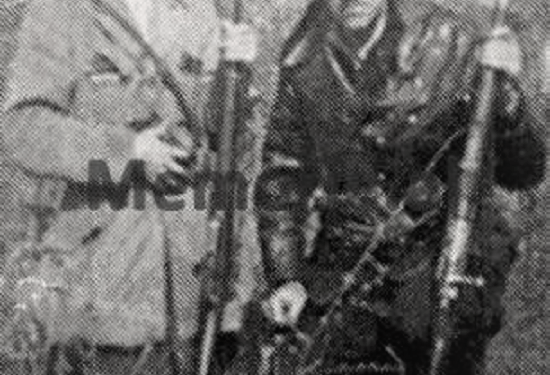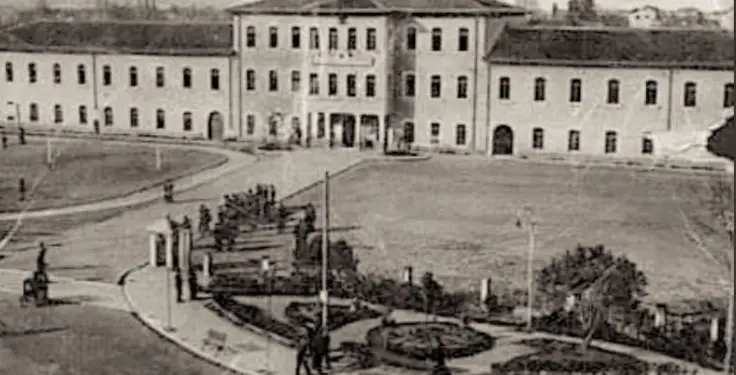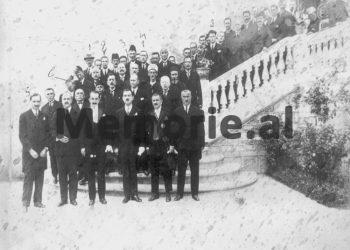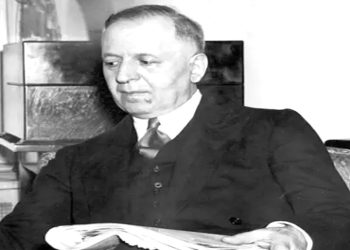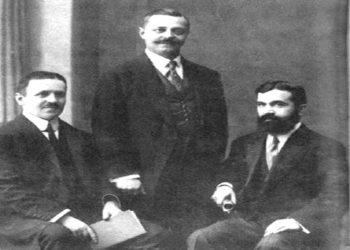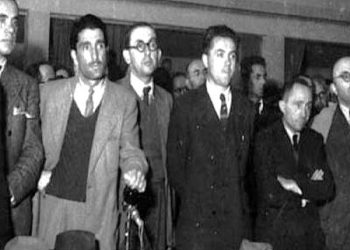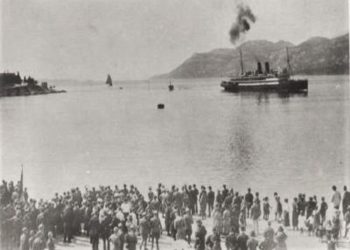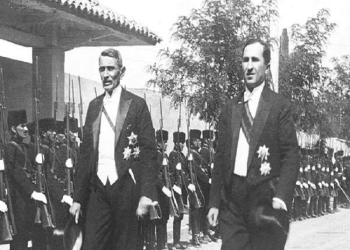Dashnor Kaloçi
Memorie.al publishes the unknown story of Selfixhe Ciu, originally from Gjirokastra, which in the period of the Zog Monarchy published the first poems and articles in newspapers and magazines such as: “Bota Re” “Java”, “Diana”, “Drita”, “Shtypi”, signing them with the pseudonym “Colombia”, which were well received by the critics of the time, being evaluated with superlatives by the well-known journalist and publicist, Fiqëri Llagami, who wrote about him in the magazine “Java”. Selfixhe went to study in Florence, Italy, where she was a classmate at the Faculty of Letters, with Qemal Stafa, Ramadan Sokoli, Musine Kokalar, Andrea Varfin, etc., and returned to Albania with her fiancé, Xhemal Broja, who had interrupted his studies at the Faculty of Law in Grenoble, France, and went to pursue studies in dramaturgy in Florence, where he also became acquainted with Selfixhena. Their engagement with the Communist Group of Shkodra with their close friend Zef Mala and then in the Anti-Fascist Movement in that city, where Xhemali was the commissar of the first partisan platoon and on the day of the liberation of Shkodra, he spoke to the people from the balcony of the Municipality. Xhemali and Selfixhe were sentenced in ’46 as anti-Yugoslav and deported to Gusmar in Kurvelesh, where they remained until ’49 when relations with Yugoslavia broke down. Rehabilitation and their return to Tirana, where Xhemali was appointed to the Committee of Culture and Arts, a lecturer at the Higher Institute of Arts and Director of the National Theater, from where he was fired in 1966 for “decadent spirit in art and culture” for to be interned again together with Selfixhena in the villages of Myzeqe, and after internment as a shovel worker on the “Gjergj Dimitrov” farm in Tirana.
“In March 1946, my husband Xhemali and I were notified to attend an extraordinary party meeting at the Ministry of Culture. The delegate of the Central Committee read a circular which said: Xhemal Broja is an enemy element because he has opposed the line of the Party for the problem of Kosovo, being informed by his friend Zef Mala ‘. After that, the accusations against me were read there, where it was said that ‘I hated the leaders of the leadership and belonged to the bourgeoisie’. The delegate of the Central Committee came very noticeably and we understood that things were not going well. As soon as he started reading the circular, the delegate said: ‘We are dealing with two types of elements. The elements that are considered anti-party, ie enemies of the Party and the doors of the Party for them are finally closed, as well as the elements that are excluded from the Party, but with the right of rehabilitation. As an anti-party element, is Xhemal Broja, a liberal intellectual who opposes the Party’s line on the Kosovo problem, a friend of Zef Malë and a son-in-law of Metat Ciu. After that, all the looks of those present were directed at me. ” This is how she remembered the fatal moments when the attack on her, Selfixhe Broja, a former student of Literature in Florence, started with Qemal Stafa and Musine Kokolari and the communist of the Shkodra Group with Zef Malë, who told us all the vicissitudes and sufferings in prisons and internments. together with her husband, the well-known intellectual and actor, Xhemal Broja, one of the first communists and Commissioner of the partisans of Shkodra, who had just been dismissed from the post of People’s Theater.
Who was Selfixhe Broja?
Selfixhe Ciu (Broja) was born in 1918 in the Varosh neighborhood of Gjirokastra and her father Ibrahim Ciu, then known as a wholesaler. Selfixheja, who was the second child in the family (she also had three sisters: Ditaren, Hanusha, Myzejen, and brother Kasemi) after graduating from high school, continued her studies for two years at the Gjirokastra High School, but after his closure, she came and finished school. a secondary school in Tirana. Since high school, Selfixhe had a passion for literature, and at the time she published her first poems and short stories in the press of the time, which she signed under the literary pseudonym “Colombia.” Her first poem. she published it in 1935 in the magazine “Populli”, when she was no more than 17 years old. After the first poem that was well received in the literary circles of that time, Selfixheja started publishing again in the magazines “Bota Re”, “Java”, “Diana”, “Drita”, “Shtypi”, etc. Less than two years after the publication of her first poem, Selfixhe Ciu was highly regarded by the well-known publicist of the time, Fiqëri Llagami, who described her as a very talented writer. Among other things, in the magazine “Java”, Llagami said: “This intellectual girl is the flagship of our evolution who with her work wants to bring down a rock that has the table of bad Albanian vices”
Student of Literature in Florence
During the period that Selfixheja continued her studies at the Tirana Gymnasium, she became acquainted with and embraced communist ideas, through her friend Zef Malës, who was the chairman of the Communist Group of Shkodra. Ever since he was in school in the late 1930s, Selfixhe has been close friends with Qemal Stafa and Vasil Shanton, with whom he introduced Zef Mala. From this friendship she had with Qemali and Vasili, Selfixheja was accepted as a member of the Communist Group of Shkodra, although she was a student in Tirana. After graduating from high school in 1938, she earned a degree and went to Italy to attend the University of Florence, Faculty of Letters. Regarding this, Selfixheja recalled: “At that time, Qemal Stafa, Nikola Shurbani, Ramadan Sokoli, Andrea Varfi, Musine Kokalari and my cousin, Qibrie Ciu, with whom I maintained a friendship, also studied with me at that university. tight “. In April 1939, after the invasion of Albania by fascist Italy, Selfixhe Ciu, together with several other Albanian students, demonstratively dropped out of school after several violent conflicts with her Italian professors. the fascist aggression that Mussolini had undertaken in Albania. After that, at the beginning of 1940, Selfixheja returned to Shqpëri together with her fiancé Xhemal Broja and many other Albanian students. After returning to her homeland, Selfixheja reconnected with communist groups and after the formation of the Albanian Communist Party, she was sent to Shkodra in charge of working with the Anti-Fascist Women’s Organization of that Region.
Selfixhe’s relationship with Xhemal Broja
After several years of the close bond between them, after returning from Italy in 1940, Xhemal Broja and Selfixa got married and married in the city of Shkodra. But who was Xhemal Broja and what family did he come from? Regarding this, Selfixheja said: “Xhemali was born in the city of Shkodra in 1918 and his father, Zenel Broja, after graduating from Istanbul for Law, returned to Shkodra and opened a notary office, where he also employed a secretary. Zeneli wanted his only son, Xhemali, to study law at one of the Western universities. He did so after Xhemali graduated from the Franciscan Fraternal High School in his hometown in 1936, sending him to study at the Faculty of Law in Grenoble, France. During the time that Xhemali was studying in France, in addition to the Faculty of Law, he also attended literature and drama courses, for which he had a special affection. During his studies in France, Xhemali joined the Anti-Fascist Movement and joined the French Communist Party. In April 1939, when Italy undertook the fascist aggression against Albania, the Albanian students of France held a demonstration in front of the Italian consulate of that city and Xhemali read the word of the protest there “, Selfixheja recalled, regarding her husband Xhemal Broja, who left studies at the Faculty of Law of Grenoble, as his passion was Literature and Dramaturgy. Having no desire to graduate from law school where he had gone at his father’s insistence, Xhemali dropped out of school in France and went to Italy to continue his studies in Florence, where his fiancée Selfixhe Ciu was studying at the time. After continuing his studies in Italy for some time, where Xhemali became active with the Anti-Fascist Movement, he was expelled from the faculty because, in his file that had been forwarded by France, he appeared as an organizer of the anti-fascist protest in front of the Italian consulate in April 1939. es.
Return of Xhemali and Selfixhe to Albania
After returning to the city of Shkodra, Xhemali and Selfixhenë opened a bookstore which at that time was used not only for the distribution of books but more for their anti-fascist activity. At that time, all their communist comrades from Shkodra gathered there, having it as a meeting point for their activity. On February 22, 1942, an anti-fascist demonstration took place in the city of Shkodra, where Xhemal Broja was one of its main organizers. In this regard, Selfixheja said: “During that demonstration, in an attempt to save me who had been captured by the Italians, our unforgettable friend Vaso Kadia (People’s Hero”) was killed. After I was arrested by the Italians, I was detained by them for 11 months in Tirana prison, and Xhemali, who was accused of being one of the main organizers of that demonstration, went underground and was sent to the Postriba area. At that time, a small group of partisans was formed there, which served as the future nucleus of the Shkodra partisan detachment, which later took the name “Perlat Rexhepi” Battalion. In both of those partisan formations, Xhemali was appointed commissioner, and Sadik Bekteshi was the commander. From that time until the liberation of Shkodra, Xhemali also led the illegal press technique, being a member of the Communist Circle and the Presidency of the Anti-Fascist National Liberation Council of the Region “, Selfixhe Broja recalled, regarding her and Xhemali’s activity in the city of Shkodra, adding that on the day of the liberation of that city, Xhemali was one of those who greeted the people of Shkodra from the balcony of the Municipality.
In 1946, Xhemali and Selfixheja were declared “anti-communist”
After the end of the war, Xhemali was appointed and worked in the Art Committee in Tirana, while Selfixheja as a journalist in the Ministry of Agriculture, where the newspaper “Bujku i Ri” was published. At the time, Xhemal Broja spoke out against the Communist Party’s and the Albanian government’s support for Yugoslavia over the Trieste issue, saying that Kosovo should also return to Albania. Based on this, on March 23, 1946, Xhemali and Selfixhena were expelled from the Party, calling them “enemies of the people and agents of the American mission.” Regarding this event, Selfixheja said: “At the time when I was working as a journalist in the Propaganda Directorate at the Ministry of Agriculture, we were informed that we had to attend an extraordinary Party meeting, which would be attended by a delegate from the Committee. Central. That same day, Jamal and I had left to go see a movie, and based on that, I had to let him know about the work. When I met him, he told me that even at the Ministry of Culture where he worked and was the secretary of the party’s basic organization, they had been notified of a meeting. The delegate of the Central Committee came very noticeably on his face and from that, we understood that things were not going well. As soon as he started reading the circular, the delegate said: ‘We are dealing with two types of elements. Elements that are considered anti-party, ie enemies of the Party and the doors of the Party for them are ultimately closed, and elements that are excluded from the Party, but with the right of rehabilitation. As an anti-party element, is Xhemal Broja, a liberal intellectual who opposes the Party’s line on the Kosovo problem, a friend of Zef Malë and Metat Ciut’s son-in-law. After that, everyone’s eyes were on me, and the delegate continued to read the accusation: After that, the same accusations were made against the spouses Zana Bogdo and Masar Shehu, although Zana was the son of the martyr and the early communist Masari, as well as Xhevo Shehu, the widow of the People’s Hero, Abaz Shehu ”.
Internment in Kurvelesh
After this meeting, where they were declared an “anti-party element,” on January 17, 1947, Xhemali and Selfixhen were interned in Gusmar, Kurvelesh, where they worked in the most difficult fields of agriculture. After the break-up of Tito’s Yugoslavia in 1949, they rehabilitated them and returned them to Tirana. After working for some time in the Ministry of Education, Selfixhe resigned. In this regard, she said: “From there I left on my own, as I could not accept that my writings would be crippled.” After that, she stayed at home dealing with writing and song lyrics, while Xhemali for almost 17 years served in several high positions and functions in the art and culture sector, as in Art Committee, Director at the People’s Theater, a lecturer at the Higher Institute of Arts, etc. During that period of time, in addition to his official duties and functions, Xhemali devoted himself to dramaturgy, his passion since the period of his early youth when he was a student in the high school of Shkodra with Professor Skënder Luarasi, who encouraged and encouraged him in that work. that had begun. So in those years, Xhemali wrote some plays which were staged by the People’s Theater in Tirana, as well as in some district theaters. In addition, he was involved in compiling and publishing a number of textbooks for students at the Higher Institute of Arts. But the work he did with great passion and extraordinary will and devotion to life was not meant to go on, as in 1966, Xhemali and Selfixhen were exiled again for six years to the village of Gradishte. of Lushnja, after being accused of “decadent spirit” in Art and Literature. After that, the screening of the film “Special Task” was stopped, where Xhemali had one of the main roles. They returned to Tirana in 1971 and at that time Selfixhja was locked up at home, while Xhemali, after working for some time in Kinostudjo as an administrator, was removed from there and sent to work as a laborer at the “Gjergj Dimitrov” Agricultural Farm. At that time, Xhemali and Selfixhe were deprived of the right to publish, as they had been expelled from the Writers’ League since 1966. Being monitored by the State Security, they were locked up at home, where Xhemali was busy studying by writing memoirs and plays. During that time, all their close friends left them, and in their house, as Selfixhja testifies, only Llazar Siliqi and Muntaz Shehu, who were the only ones who attended the funeral, were trampled on. Xhemal Brojës, who passed away in 1976, denigrated by the communist regime and abandoned by all his friends./Memorie.al






